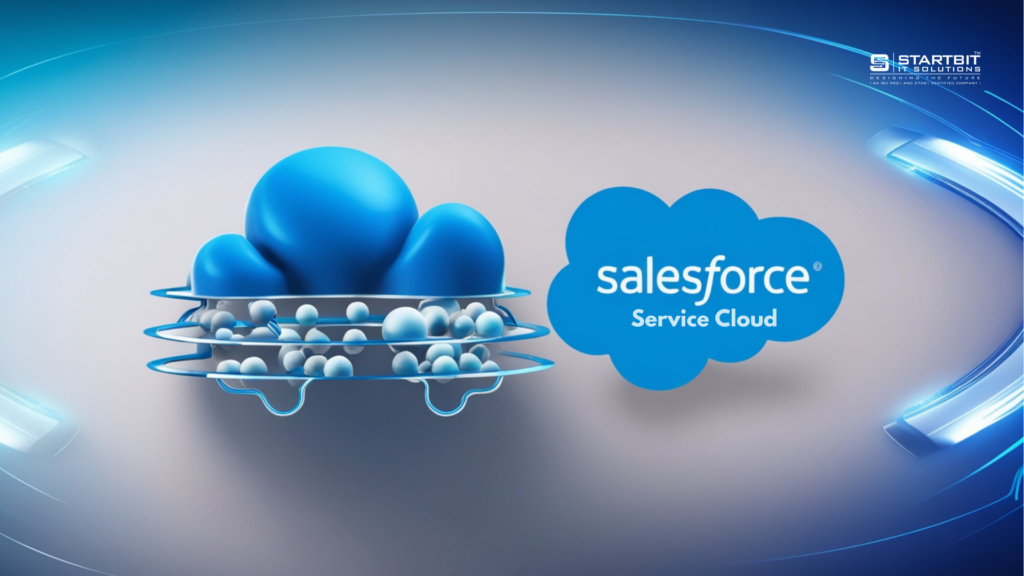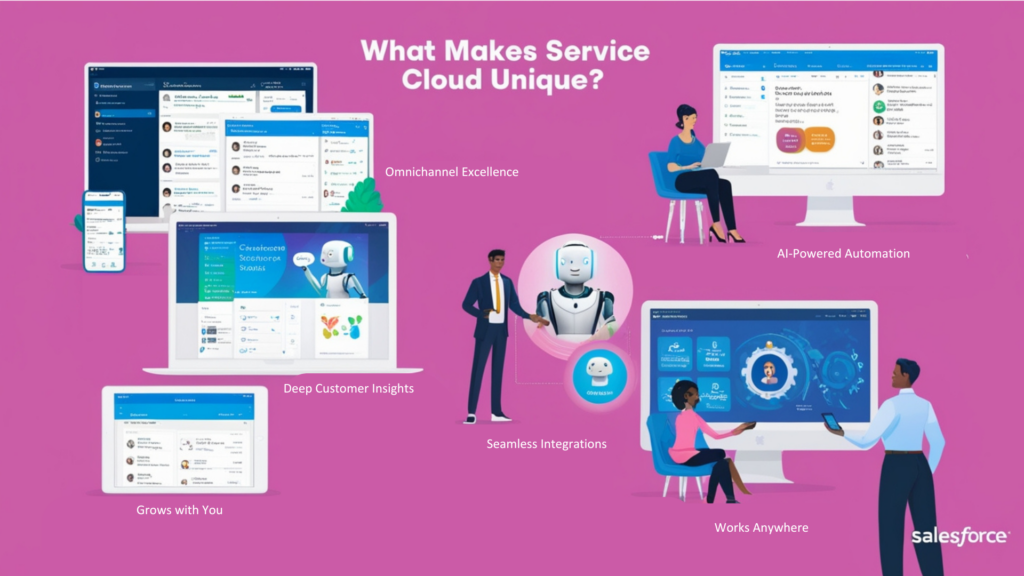Salesforce is the world’s number one leading CRM (customer relationship management) platform. Salesforce covers a 22% share of the entire CRM market left behind all its competitors like SAP, Microsoft, Zoho, and others. Which makes it the world’s number-one CRM platform. Salesforce was founded in 1999 as a CRM.

What is the salesforce service cloud-
Salesforce offers many types of clouds which include Sales Cloud, Marketing Cloud, Service Cloud, Commerce Cloud, Analytics Cloud, and Experience Cloud, covering various aspects of CRM. The salesforce service cloud is the most in-demand cloud type, which helps businesses enhance sales, service, e-commerce, and digital experiences.
Let me explain the salesforce service cloud with an example-
Let’s think about a clothing retail store that is a start-up, but because of the quality and price of its items, it gets booms within a month. Now they are not able to manage their customers and get flooded with emails and calls about delayed orders, returns, and sizing issues. They struggle to track which complaint should be resolved first.
Here, the salesforce service cloud comes into the picture-
Now we will understand the service cloud in terms of this cloth store and how it is beneficial for them.

1. 360-Degree Customer View–
This cloud offers a 360-degree customer view which means it unifies every touchpoint like purchases, support chats, and feedback into one single view. With this full picture, businesses can personalize interactions, spot sales opportunities, and turn happy customers into die-hard fans.
Benefit: Their agents can instantly see a customer’s entire history (past orders, returns, and preferences) in one place.
Example: When a customer calls about a delayed order, the agent can say, “I see your jeans are delayed. I am so sorry about that! Since you are our loyal customer so have upgraded your shipping to express at no cost. Again, sorry for the inconvenience.
2. Self-Service Options (Knowledge Base)-
The Salesforce Service Cloud knowledge base is a self-help library filled with easy-to-understand articles. It lets customers quickly solve common issues on their own, reducing wait times and support calls.
Benefit: Customers solve simple issues themselves, reducing the load on your team.
Example: their FAQ page answers, “How long do returns take?” so customers don’t need to make a call to support. The store now gets 30% fewer repetitive queries.
3. Real-Time Analytics & Reports-
Salesforce Service Cloud lets you monitor support team activity and customer issues as they happen.
Benefit: Track support team performance and spot trends.
Example: The manager notices “sizing issues” are the top complaint, so they add size charts to product pages, cutting complaints by 40%.
4. Omnichannel Support-
Omnichannel service is like a support service provided by the salesforce service cloud. With this service, customers can contact the support through any channel (text, call, email) without repeating their story or mishappening, and agents get a complete snapshot of past interactions to deliver personalized help instantly.
Benefit: Manage emails, calls, texts, and live chat in one dashboard.
Example: A customer named Deep emails support about a delayed laptop order. Later, he gets impatient and starts a live chat.
How Service Cloud Worked in this case:
- Email to Chat Transition: When Deep switches to chat, the agent instantly sees his email complaint, order number, and past interactions (e.g., he is a loyal customer who bought a tablet last month).
- No Repeats: The agent doesn’t ask, “What’s your issue?” Instead, they say:
“Hi Deep! We’re sorry your laptop is delayed. It’s arriving tomorrow, and we’ll add a $20 credit for the wait. Would you like tracking updates via text?” - Outcome: Deep feels heard, gets a resolution without repeating himself, and stays loyal.
5. Mobile-Friendly app-
The Salesforce CRM has its own mobile application. Where agent can update their leads, solve cases, log calls, and check dashboards live anywhere. It has instant syncing, so the team can work from anywhere and customers don’t have to wait.
Benefit: they can access cases and leads from phones or tablets.
Example: During a holiday sale, the store manager can approve refunds or check case statuses from his phone.
6. Integration with Other Tools-
Salesforce supports various types of integrations with many apps. For example-
- Collaboration Tools: Connect to Slack or Teams to alert agents about urgent cases in group chats.
- Email & Calendars: Sync with Gmail or Outlook to log support emails as cases and auto-schedule follow-ups.
- Payment Gateways: Integrate Stripe/PayPal to resolve billing issues without leaving the Service Cloud.
- ERP Systems: Link with SAP or Oracle to let agents check order status, inventory, or invoices in real-time.
- Analytics: can get the live data into Tableau/Power BI to track trends like “peak complaint hours.”
- Marketing Apps: This can be merged with HubSpot to trigger personalized follow-ups and post support.
Benefit: We can connect Service Cloud to inventory, billing, or marketing tools.
Example: When a customer asks, “Is this dress back in stock?” the agent can check the inventory in real time and send a restock alert automatically.
7. Customer Satisfaction Surveys-
Customer satisfaction surveys in Salesforce Service Cloud gather feedback automatically after the support case has been closed. For example, simple questions like “How did we do?” can be sent via email or SMS. Since these surveys integrate well with customer profiles, teams can immediately know if a valued client gave a low score or spot trends like persistent complaints about slow response times. Alerts for bad ratings go to managers, who can then contact individuals personally to resolve problems. Benefit: Send feedback requests automatically after a case is closed. Example: A post-resolution email says, “How did we do?” Good reviews help the store’s online reputation.
8. Scalability for Growth-
Salesforce Service Cloud grows alongside your business, effortlessly handling customer queries whether you are adding 10 agents or 10,000 users, without slowing down or requiring costly overhauls. Its cloud-based foundation scales globally, supporting multiple languages, currencies, time zones, and many other special features.
Benefit: Add more users, channels, or features as your business grows.
Example: When the store opens a second location, Service Cloud easily handles double the cases without slowing down.
Final Outcomes for the Retail Store of using Salesforce service cloud-
- Happier customers: Faster, personalized service.
- Less stressed teams: Automation handles repetitive tasks.
- Data-driven decisions: Reports help improve products/services.
- Future-proof: Adapts as the business grows.
What Makes Salesforce Service Cloud Unique: Friendly, Intelligent, and Ready to Scale
Salesforce Service Cloud is not an average CRM. It’s a force to reckon with in customer service. This is how it stands out from the rest for companies of any size:
1. Speaking to Customers Where It Matters Most
While other CRMs have problems with emails, calls, and chats all over the place, Service Cloud brings them all together in one dashboard. Think of a customer starting off with a complaint posted on Twitter, shifting to email, and then calling without voicing the complaint, repetition, or any chaos. Every interaction is in real-time for the agents to be able to say, “I see you messaged us earlier; let’s fix it now.” There’s no other platform that forms omnichannel support in this manner.
2. It Knows Your Customers Like a Friend
Most CRMs show basic details (name, order history). Service Cloud goes further: it stitches together past purchases, support tickets, survey feedback, and even social media mentions into a single profile. Agents don’t just solve problems, they personalize solutions.
For example, if a loyal customer reports a defective product, the agent can offer a refund and a discount on their favorite item. This 360-degree view builds trust and loyalty faster than generic tools.
3. It Grows with You, No Headaches
Many CRMs force businesses to switch systems as they scale. Service Cloud grows with you, whether you are a 5-person startup or a 5,000-employee enterprise. Need to add live chat during holiday sales, you can do it. Want AI chatbots to handle 50% of routine questions? you can do with it.
4. It Automates the Annoying Stuff
Automation of the Annoying Stuff Other platforms all require you to tag cases manually or draft replies. With the AI (Einstein/Agentforce), Service Cloud can forecast issues, prioritize urgent cases, or even recommend solutions. For example, if 100 customers are asking “Where’s my order?” an Einstein Bot can draft an autoreply with tracking links, freeing up agents to deal with complex issues.
5. It Works Wherever You Do
While competitors tether teams to desks, Service Cloud’s mobile app lets managers approve refunds from their phones, agents update cases on tablets, or CEOs check dashboards mid-flight. Everything syncs instantly, so remote teams stay in sync.
6. It Plays Nice with Other Tools
Service Cloud does not force you to drop your favorite apps. It connects to payment systems (PayPal/stripe), email (Gmail/outlook), collaboration tools (Slack/Teams), and even IoT devices. For example, a smart thermostat company can link Service Cloud to sensors, if a device fails, support auto-creates a case and dispatches a technician.
The Bottom Line :
Salesforce Service Cloud is all about fixing stuff and turning customer service into a growth engine. It is faster, smarter, and more flexible than stifling CRMs, enabling businesses to save time, increase loyalty, and respond to changing circumstances. Whether you’re a one-person operation or a global business, it’s a Swiss Army knife for customer support: always on hand, constantly evolving, and not just designed for one thing.
If you want customers to feel that they are being valued, teams to remain empowered, and your business to continuously future-proof itself, Service Cloud isn’t just better. It is in a league of its own.
To know more about Salesforce development and consulting services, contact Startbit It Solutions.


